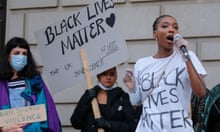Prominent academics and student leaders have criticised the government’s equalities watchdog for including prejudice against white British students in its inquiry into racism in UK universities.
They accused the Equality and Human Rights Commission (EHRC) of drawing a false equivalence between what it described as racial harassment against white British students and staff and the racism suffered by their black and minority ethnic peers.
According to the watchdog’s student survey, 9% of white British students experienced racial harassment, compared with 29% of black students and 27% of Asian students.
The report, Tackling Racial Harassment: Universities Challenged, highlighted examples of anti-English sentiment at Scottish and Welsh universities.
A white English member of staff told the inquiry that two Welsh colleagues used a slur when referring to English people: “She was speaking in English and changed to Welsh for that word thinking I wouldn’t understand. I’ve never come across so much racism as when I moved to Wales.”
Heidi Mirza, a visiting professor of race, faith and culture at Goldsmiths, University of London, said the EHRC’s inclusion of anti-British sentiment watered down the impact of racism on people of colour.
“Anti-black, anti-Asian and Islamophobic and antisemitic racism is on a different scale to the anti-English sentiment,” she said. “The experience that the Scottish and the Welsh students might experience will not equate to what skin colour and visible difference means to students on campus.”
Fope Olaleye, the black students’ officer at the National Union of Students, said the EHRC had ignored pleas made at a roundtable event with the inquiry team earlier this year to exclude anti-white harassment from their report.
Olaleye, who uses they, tweeted: “I remember sitting at one of the round tables and a bunch of students and myself had to explain in excruciatingly detail that ‘anti-white prejudice’ should have no place in a report on racial harassment but I see we were not listened to.”
They later added: “There was a definite tension with the students in the room who were concerned by how they were defining racism in the report and many of us pressed and challenged it.”
Gargi Bhattacharyya, professor of sociology at the University of East London, said similar concerns had been raised by the University College Union’s black member’s standing committee in a meeting with the EHRC in April.
“It didn’t seem to us they had a definition of minority ethnic,” she said. “They just [asked] has anyone ever faced a racist incident. So with no framing it’s surprising it wasn’t even more white people saying yes.”
The committee emailed the EHRC in April to outline their concerns with the university racism inquiry but they never received a response, she added.
Bhattacharyya said: “It matters that the people whose interests [the EHRC] purport to represent find them to be credible and part of that credibility is feeling that you have been listened to. Otherwise people get the message ‘our view is irrelevant to you’.”
Zubaida Haque, deputy director of race equality thinktank the Runnymede Trust, said: “It’s bewildering why the EHRC would conflate prejudice experienced by white staff in Welsh and Scottish universities with the deeply endemic racism experienced ethnic minority staff and students across all universities. This raises some concerns about the commission’s current approach to understanding and tackling racism.”
An EHRC spokeswoman said its report made clear that racial harassment predominantly affects black and Asian students.
She added: “We received a small number of examples of anti-English sentiment at Scottish and Welsh universities, offensive comments about Gypsy and Irish Traveller students and examples of anti-Semitic slurs for both staff and students. To ignore these issues raised with us would have been wrong. Our recommendations are designed to ensure that universities can appropriately address and tackle racial harassment in all of its forms.”









